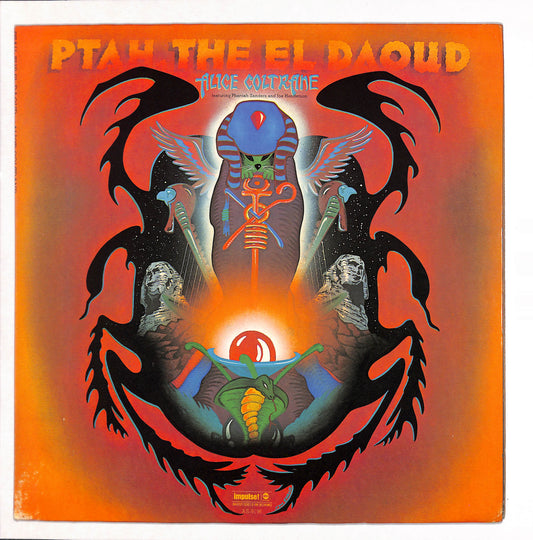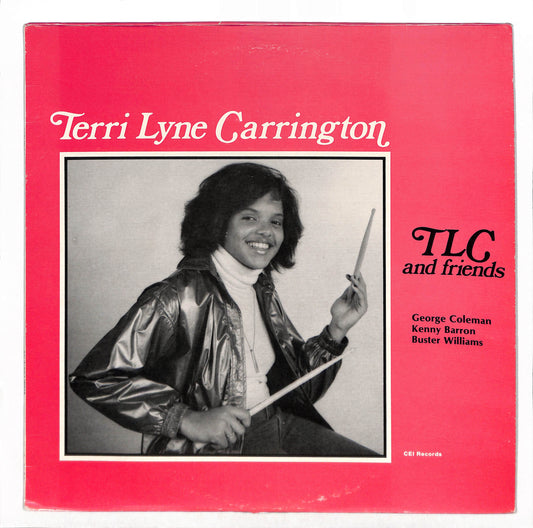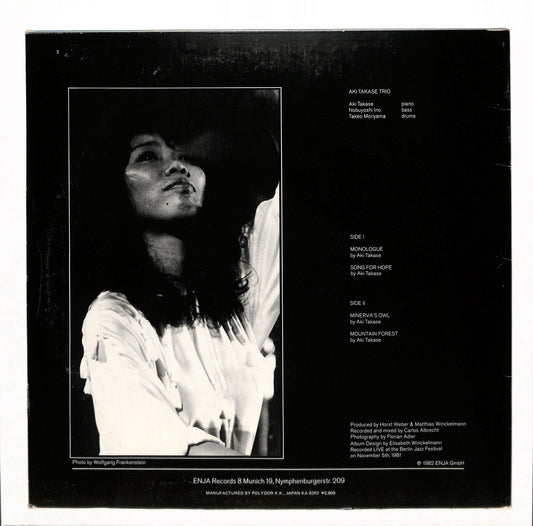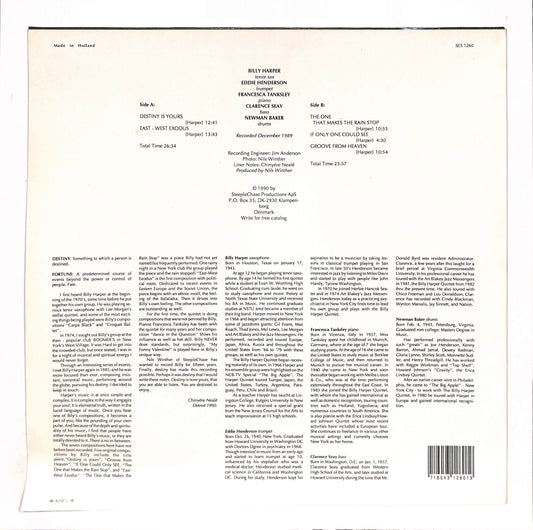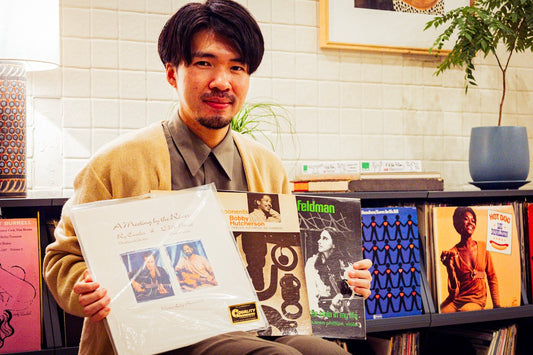"WHAT'S IN YOUR CART?" is an interview series where we invite record-loving guests to choose '5 Records They Want Right Now' from the ELLA ONLINE STORE lineup. For the special first edition, we feature a grand three-part series with three different guests.
Our second guest is Hiroko Otsuka, who shares her passion for jazz and records not only as a DJ but also as a producer, curator, and writer. While carefully browsing and listening to the racks at the vintage record showroom "ELLA RECORDS VINTAGE," she selected five records that are uniquely hers. Enjoy her discussions on records, which also reflect her sympathy for female jazz musicians and her perspective as a mother of two.
Interview & text: Mikiya Tanaka (ELLA RECORDS)
Photo: KenKen Ogura (ELLA RECORDS)
Furniture design & production, Interior coordination: "In a Station"
Furniture cooperation: "BULLPEN"
Special thanks to: Satoshi Atsuta
Hiroko Otsuka's '5 Records I Want Right Now
①Alice Coltrane/Ptah, The El Daoud (1970) US
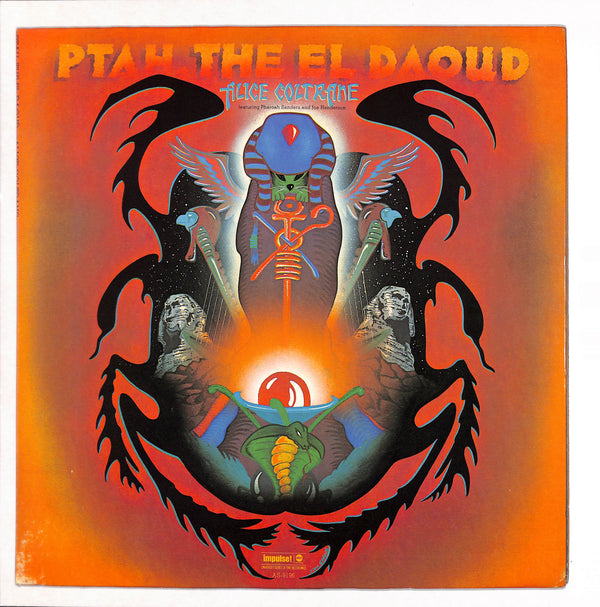
Lately, I've been approaching music from a different angle than before. I've been releasing compilation CDs featuring only female artists (such as "Music for The Room + CORE PORT Jazz by Hiroko Otsuka," 2022), and I'm also exploring a lot of female jazz musicians. Alice's records have become quite expensive now. I used to buy a lot of her records, but for some reason, I sold them... and I regret it. However, the way Alice is evaluated now is completely different from back then. It feels like the world has finally caught up with what she has been doing, and that makes me happy. This album, in particular, highlights her exceptional composition skills and seems to encapsulate many of her various essences. Looking back, I realize how bold she was to do what she did at that time. I can't help but think, "Alice, you were truly amazing."
②Terri Lyne Carrington/TLC and Friends (1981) US original
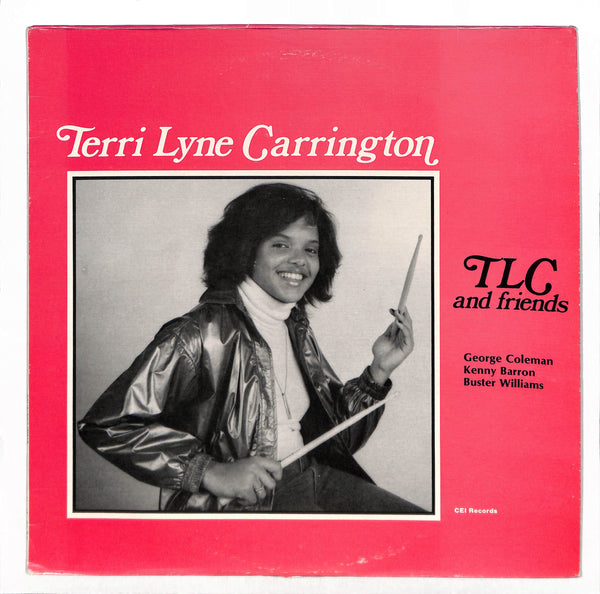
I once had the opportunity to be involved in an interview with Terri Lyne Carrington. Recently, she has been compiling works by female composers ("New Standards Vol.1," 2022) and founded a department at Berklee (Editor's note: She established the Berklee Institute of Jazz and Gender Justice in 2018). She has greatly influenced me. I feel like I need to have her private records in my collection. The more I research private press records, the more I realize how differently they're produced compared to major label releases. The sound, the smell of the records, and the very existence of private presses are things I absolutely love, so I want this one on vinyl. The members are also fantastic. I love Buster Williams (b), and Kenny Barron (p) is also part of it.
③Aki Takase Trio / Song for Hope (1982) Japanese Edition
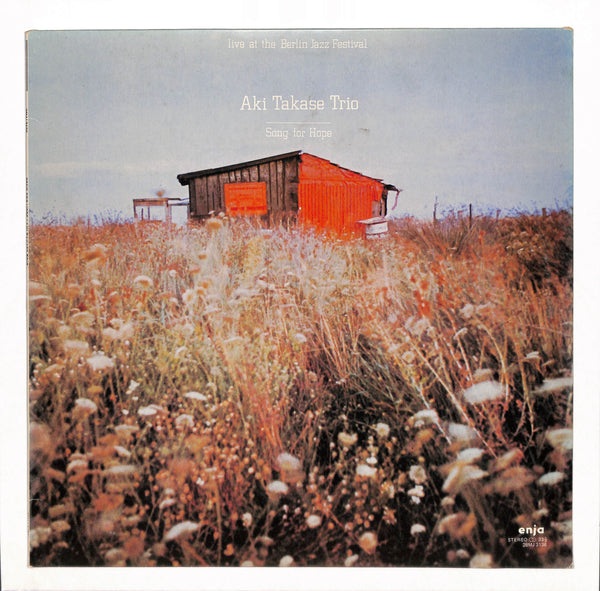
This album is a live recording from the Berlin Jazz Festival, and in particular, A2 "Song for Hope" is not only a great track but also captures the live atmosphere perfectly. It has a sense of quietness, focus, and lyricism that really moves you. It's rare to find something that balances these elements so well. Even though it's a long piece, when I play it at a listening bar, everyone says it's amazing. The way it maintains concentration throughout and then erupts with emotion at the end really resonates with the listeners.
④Roy Haynes / Togyu (1975) JPN original
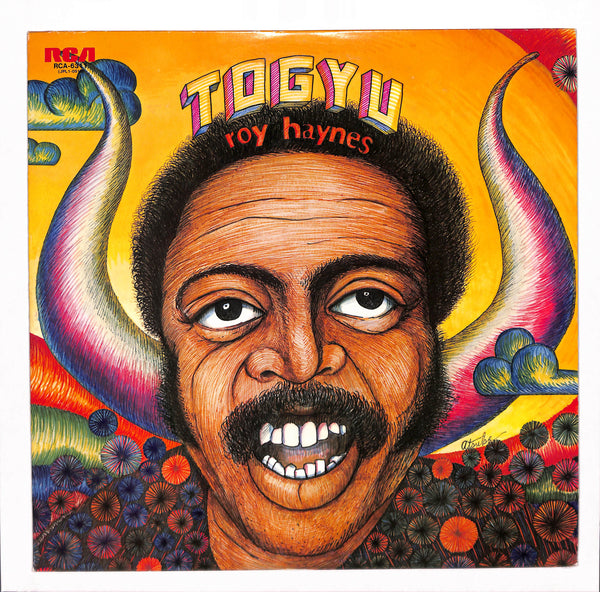
This is a record I've wanted for a long time. It's a project album by a Japanese label, and about ten years ago, I had the chance to meet the producer, Teruo Nakamura, and hear many stories from him. However, rather than diligently searching for it online, I wanted to find it in a store someday. You know, those kinds of records. I was reminded of it when I visited a jazz café in Hamamatsu and saw this striking jacket displayed prominently. I thought, "Oh right, I still don't have this." I've always collected Japanese project albums by overseas musicians, and I used to search for them in rural areas before the prices went up. But I still haven't come across this one.
⑤Billy Harper Quintet / Destiny Is Yours (1990) Dutch Edition
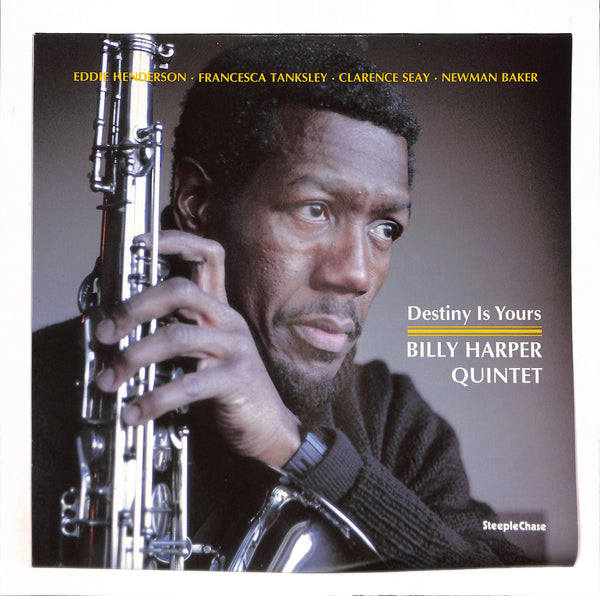
Otsuka
I absolutely love Billy Harper. He's probably my favorite artist. His style has remained consistent over the years, but he manages to convey his energy and strength within a certain restraint, which is really captivating. This album, as a quintet, is probably the last one released in real time as a record. By this time, CDs had become mainstream, so records from this era are quite rare. Billy Harper has a CD from 2008 called "Blueprints of Jazz" that features Amiri Baraka, which is also fantastic. That's why I've always wished that his works from the 2000s and beyond would be released on vinyl.
Interview: DJ Hiroko Otsuka and Records

━━Tell us about how you first encountered records.
Otsuka:Since my family wasn't particularly enthusiastic about music, my serious encounter with music came around the time I started getting interested in fashion, which was in middle school. Fashion magazines often featured club snapshots and DJ charts from various clubs. That's how I learned about clubs and DJs. My family home is in Chiba, and there was a Disk Union store in Kashiwa, so I realized I could buy records there.
I think the initial attraction was simply wanting to carry a large shopping bag that could fit records. At that time, punk and fashion were closely connected, so I wanted to carry bags from punk record stores in Shinjuku, for example lol.
But at first, I didn't know anything about music, so I had no idea what to buy. So, I just looked for something cheap and ended up buying used 12-inch records. I think I bought stuff like Soul II Soul and late 80s Earth, Wind & Fire, which were very cheap at the time. I bought those without really knowing much about them, but for some reason, I still have them. It seems like my initial instinct towards Black music was spot on, which made for an interesting encounter.
At first, I went to clubs like "LONDON NITE" at Shinjuku MILOS GARAGE. Later, I frequented places like Inkstick and Organ Bar. I didn't particularly want to become a DJ; for me, clubs were places to discover new music. I would learn about tracks from DJs, and from there, I somehow ended up buying two turntables, making mixtapes, and eventually started DJing. It really was just a hobby at the time.

━━How did you first encounter jazz?
Otsuka:At first, I was listening to punk, and then I was deeply moved by Marvin Gaye on the radio, which made me fall in love with soul music. Also, hip-hop was becoming popular at that time, so I started listening to that too. My appreciation for jazz came much later. I did buy jazz-funk stuff, like Herbie Mann's fusion period albums, but the jazz section in record stores was intimidating with its out-of-print records and the way everything was organized by instrument. The customers there seemed to have high expectations lol. So, I grew to like jazz through the flow of hip-hop.
I was also into underground hip-hop, and as I was DJing, I realized that the feel of underground hip-hop was completely in sync with spiritual jazz and obscure private-label jazz. Moreover, as a listener, not just from a DJ perspective, I was blown away by the power, solitude, sadness, and a mix of intense emotions that jazz from private labels conveyed. It felt like it was not in an "ordinary state." It hit me hard, and I thought, "Wow, this is incredible."
That's why I didn't start with the traditional jazz textbooks like Blue Note or hard bop. Instead, I got hooked on artists from labels like Tribe right from the beginning.
━━You mentioned that you are consciously exploring female jazz artists recently, right?
Otsuka:Yes, that's right. In the past, my main focus was on DJing, constantly seeking my own sound. But as I started writing, for example, working on liner notes for reissues of records that were popular with DJs in the past or for contemporary jazz artists like Nubya Garcia, I began to research the background of these works and learned a lot. I discovered how supportive the environment is for female musicians abroad today and how remarkable it was for female jazz musicians of the past to navigate a male-dominated world.
For example, Betty Carter and Mary Lou Williams started their own labels and personally distributed their records to stores, which is an incredible feat. After becoming a mother myself, I began to understand how difficult it is to do everything on your own and the importance of collaborating with others to continue making music. The careers of these women are incredibly inspiring, showing how to build a career while overcoming challenges, and it gives me courage just to learn about their experiences.
I wanted to share these discoveries, so now I write about and have radio segments focused on women in jazz.

━━Do you still visit record shops?
Otsuka:Honestly, I don't go nearly as often as I used to. I want to, but it's difficult with childcare. However, I've been to ELLA RECORDS with my child on my back lol. I'd like to take my child to other record shops in the same way, but it's not always feasible, so I don't go as much as I used to. But when I travel alone for work, I always make sure to visit record shops. It's a rare opportunity, so I might actually concentrate more on buying records during those trips. My record shopping sprees in rural areas might be more intense now lol.

A flyer featuring a photo of Ms. Otsuka visiting ELLA RECORDS with her child.
━━How many records do you currently own?
Otsuka:Uh, I'm not really sure... It’s quite uncertain, but maybe around 4,000 or 5,000? About 15 years ago, I used to sell and buy records to refine my collection and establish my style as a DJ. However, recently, I haven't had the time to carefully curate my collection at home. Although I buy records at a slower pace than before, my collection continues to grow.

━━How do you manage such a vast record collection?
Otsuka:I roughly organize them by genre on the shelves. The upper shelf is dedicated to soul, transitioning from older records to 80s and more recent ones, creating a sort of gradient. Below that, I have a section specifically for rare private press jazz records. There's also a section for collector's items like Japanese jazz, a European jazz section, and others. Then, I have sections for hip-hop, Japanese records, rock, and jazz-rock. Additionally, I create corners for genres that don't fit elsewhere, records that are difficult to categorize, or those I want to organize from a DJ's perspective. I also have sections for ambient music and tribal records.
I'm quite rough with my organization, so nothing is in alphabetical order. It's more like, "This goes around here" or "That goes somewhere to the right over there." So, I can't always find what I'm looking for right away lol. Plus, records that don't fit on the shelves are piling up on the floor. After using records for a DJ set, I often just leave them on the floor and don't get around to putting them back lol. It would be cool to manage everything properly, but I just don't seem to get around to it. I'd love to hear how others do it.

━━Do you have a preference for original pressings?
Otsuka:Yes, I do. I used to be quite strict about getting original pressings, actively seeking them out. Nowadays, if I come across one, I'll buy it. Sometimes I start with a reissue and then look for the original later. Recently, though, some reissues have really good sound quality, so I'm okay with having the reissue, or sometimes I even prefer it. However, when I want a record for its "sound," a reissue might be fine, but if I have a special attachment and want the "presence" of a particular record, it has to be an original.
━━What's at the top of your record want list?
I would love to have an original pressing of "Yakhal' Inkomo" (1968) by the Mankunku Quartet from South Africa. There are so many records on my want list, but another one is "Medasi" (1984) by Haki R. Madhubuti / Nation: Afrikan Liberation Art Ensemble. I've always wanted to play this one as a DJ, but despite having the chance, I never managed to get it. After giving birth, I felt a deep connection to the message in the song "Children," and as I write now, I am also rediscovering the brilliance of Geri Allen. Geri, who was a student at Howard University at the time, contributed to this record as a composer and pianist. Nicole Mitchell, a current Chicago flutist, once worked at Haki's company and released works inspired by this album. Knowing the background and message of the album makes me even more fascinated by the original pressing than I was in the past.

━━Has the way you buy and listen to records changed since the advent of subscription services?
Otsuka:I don't think I've changed much. I do use subscription services, but recently, I've stopped. My usage tends to fluctuate; sometimes I'm very active in exploring and researching music, while other times I think, "That's enough, let's cancel for now." Currently, I'm in the latter phase. Relying too heavily on one tool and using it exclusively doesn't suit me. With subscription services, once you get hooked, you start wanting to search for everything. When that happens, I can't spend as much time with my child, and I dislike losing that control. Instead, I've come to prefer playing records where everyone is present and listening together.

━━What makes a "good record shop" for you?
Otsuka:Oh, that question puts a lot of pressure on me lol. Honestly, I've been admiring record shops for decades, so I'm truly humbled to be asked such a question lol. For me, just the fact that a record shop exists makes me happy, so I'm willing to visit any kind of shop.
In addition to that, I’d say it's great if a shop makes it easy to listen to records. A place where you can play records yourself and skip tracks freely. This might sound a bit desperate, but when you're raising kids, every day is a battle against time lol. I’m always thinking about how many minutes I have left before I need to pick up my child, but I still want to visit record shops. So, these days, I want to buy records as efficiently as possible. That's why I'd be grateful if I could bring my child to a record shop, and it would be wonderful if it were a place where my child would also want to go. In that sense, here (ELLA RECORDS VINTAGE) has a welcoming atmosphere for people with young children. It's spacious. But don’t worry, I'll make sure my child follows proper manners and doesn’t touch things without permission. It’s the parent's responsibility after all lol.



